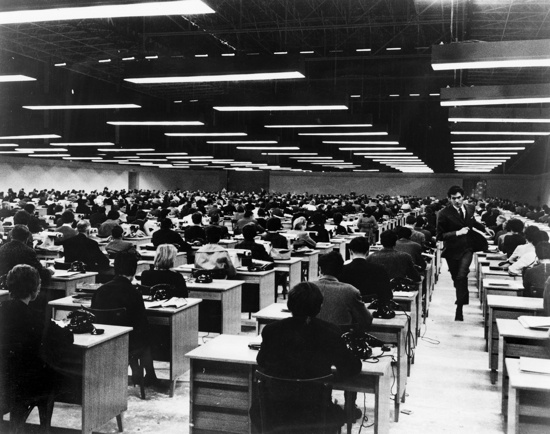I think the most defining negative quality of bureaucracy is simply incompetence. Look at the example of relief efforts in New York City in the wake of Hurricane Sandy. When the federal government was in charge, FEMA did quite well. But when $100 million was shifted to the city, the efforts were a fiasco. A program called Build It Back was established by Mayor Bloomberg, and in his final 14 months in office not a single destroyed home was built back. Not one. Local homeowners living in ruins or in shelters were summoned to government offices numerous times to provide information, but while paperwork piled high, no one was helped. (So far during the de Blasio Administration, a little more than 300 homes have been completely repaired out of more than one thousand where work has begun.)
When David Graeber looks at bureaucracy, he senses something more sinister than ineptitude. He sees the potential for routine violence. In an interview about his forthcoming book, The Utopia of Rules, with David Whelan of Vice, the anthropologist looks into our future and believes an Orwellian nightmare may be headed our way. I don’t agree with Graeber’s vision of technological dreams vanishing or of library fines being commonly treated as felonies, but we’re already living in a society where “quality-of-life” policing is often used as racial punishment and certainly we’re being more tracked and quantified each day. An excerpt:
Vice:
OK, say we’re 50 years from now, this moment. What’s happening?
David Graeber:
Research investment has changed. Flying cars are scrapped. They say to hell with going to Mars. All this space age stuff is done. Money moves elsewhere, such as information technology. And now every intimate aspect of your life is under potential bureaucratic scrutiny, which means fines and violence.
Vice:
What happens if you step out of line?
David Graeber:
Bureaucratic societies rely on the threat of violence. We follow their rules because if we don’t there’s a chance we’ll get killed. A good way to think of this is through libraries.
Vice:
Libraries?
David Graeber:
Say you want to go get a book by Foucault from the library describing why life is all a matter of physical coercion, but you haven’t paid an overdue fine and therefore you don’t have a currently valid personal ID. You walk through the gate illegally. What’s going to happen?
Vice:
A smacked bottom?
David Graeber:
Men with sticks will eventually show up and threaten to hit you.
Vice:
Wait. This actually happens?
David Graeber:
Yeah. Check out the UCLA Taser incident in 2006. They Tasered him, told him to get up, then Tasered him again.
Vice:
What’s the point in that?
David Graeber:
The point is bureaucracy. They don’t care who he is or why he’s there. It doesn’t matter who you are. You just apply the same rules to everybody, because that’s “fair.”
Vice:
But if you’re at the top of the bureaucratic tree, those rules don’t apply.
David Graeber:
Bureaucracy provides an illusion of fairness. Everyone is equal before the law, but the problem is it never works like that. But to advance in a bureaucratic system the one thing you CANNOT do is point out all the ways the system doesn’t work the way it’s supposed to. You have to pretend it’s a meritocracy.•
Tags: David Graeber, David Whelan

